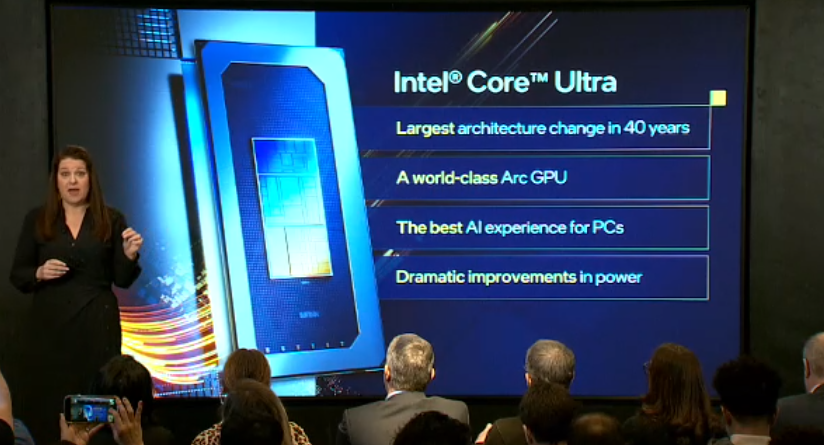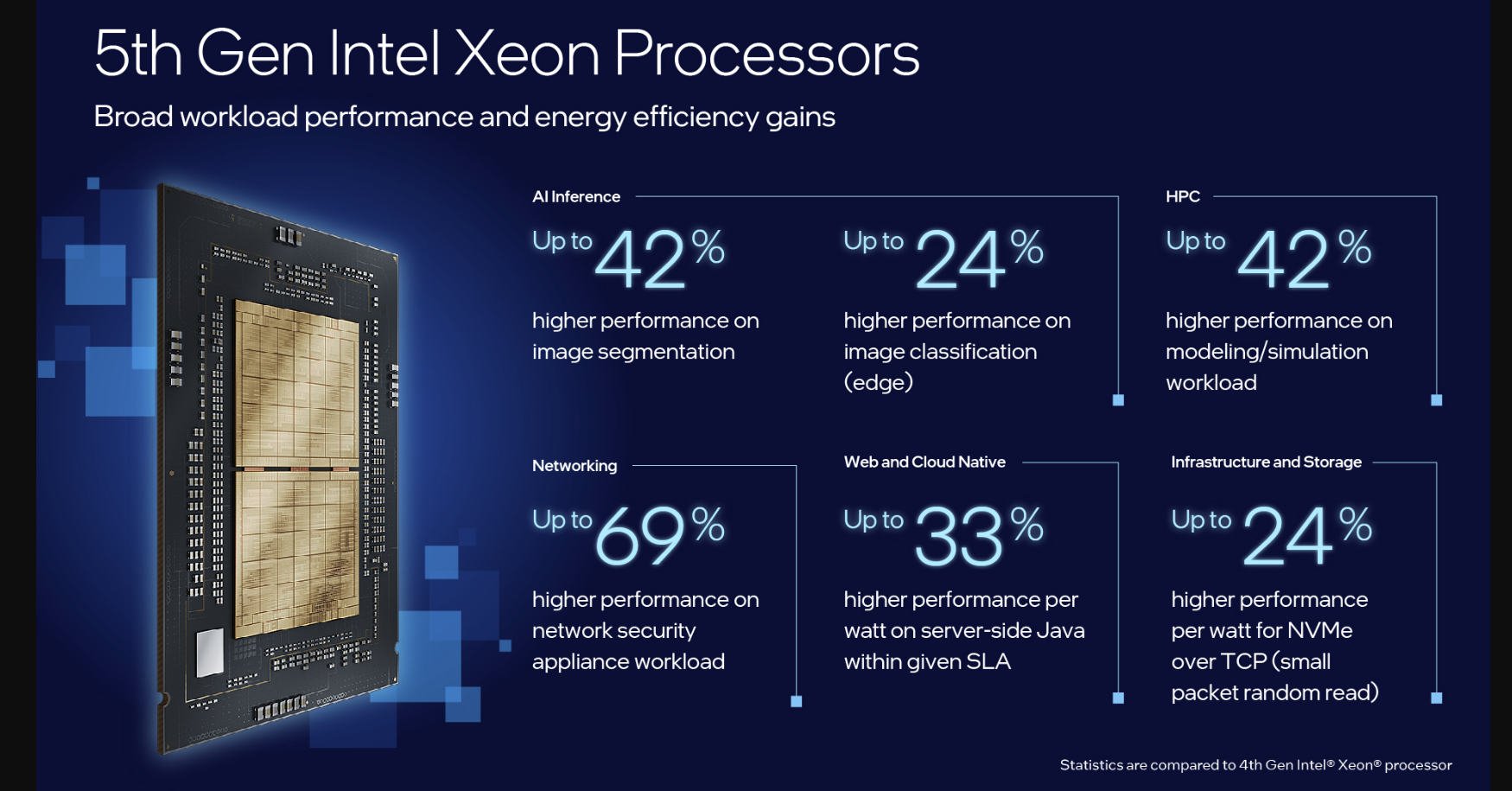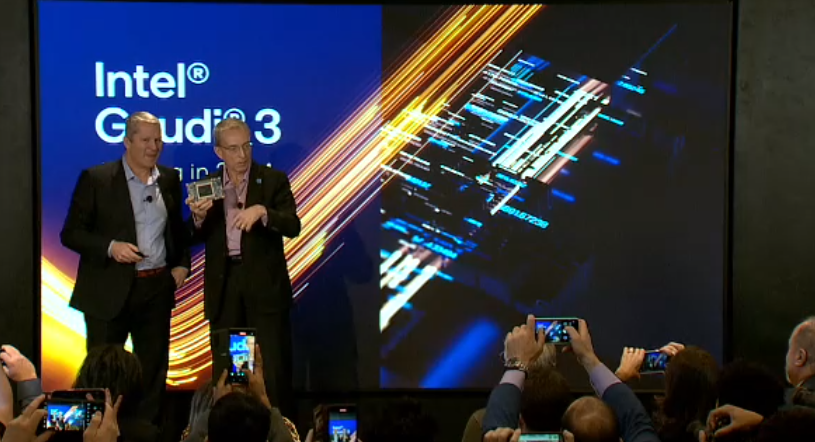Intel's AI everywhere strategy rides on AI PCs, edge, Xeon CPUs for model training, Gaudi3 in 2024
Intel's launch of its Core Ultra mobile processors and 5th Gen Intel Xeon chips rhymed with product rollouts of yesteryear, but this one had higher stakes. Intel had to prove that it can be an AI player along with Nvidia and AMD even though the company is playing catch-up with its Gaudi3 AI accelerator.
In New York, CEO Pat Gelsinger made it clear that AI is "in the early innings." In fact, AI may just be still in the preseason of the impact it'll have. There's a big opportunity to leverage AI everywhere across the computing stack to create augmented intelligence.
Gelsinger said AI will be more of a hybrid affair across cloud, data centers, edge, network and end-user devices. Gelsinger said Intel is positioned to bring AI across multiple levels of the stack. He also noted that Intel can infuse AI into existing infrastructure and save enterprises the hassle of a new buildout, which by the way has so far benefited Nvidia.
He said:
"You don't have to build new data centers. You don't have to stand up new networks, new management, new security. We're going to infuse AI into every data center that's built on Xeon and that's what we're announcing today. Same applications. You don't need a forklift, those applications now. We're just going to build it in and enhance what you already do with new AI capabilities.
"We're also seeing that the world is moving from high end training. A few people create weather models, lots of people use them. The same is going to happen with AI. A few people train and lots of people inference."
Gelsinger's argument--and Intel's pitch--is that inference will happen at the edge and increasingly PCs. Gelsinger's other mission was to highlight that Intel can execute. He reiterated that Intel is on track to deliver five new process technology nodes in four years.
Intel's AI Everywhere Dec. 14 rhymed with AMD's Dec. 6 launch of its AI accelerators that are now in production. AMD has a similar vision of using its processors to power AI applications in the cloud, data centers and all the way to PCs. AMD CEO Lisa Su said:
"We are so well positioned to power that end-to-end infrastructure that defines this new AI era from massive cloud server installations to on-prem enterprise clusters to the next generation of AI and embedded in PCs."
Su added that AMD must deliver energy efficient GPUs, CPUs and adaptive computing systems for AI training and inference everywhere.
Sounds familiar, eh? Nevertheless, Intel vs. AMD hasn't been zero sum through the PC era and most likely won't in the AI era either. Directionally, AMD and Intel have similar visions. And Nvidia is the biggest risk to both companies.
Here's what Intel outlined for its AI everywhere stack.
Intel Core Ultra
Gelsinger said Intel Core Ultra represented the biggest PC transformation since the company launched Centrino chips to give laptops the ability to connect to Wi-Fi.
Intel Core Ultra is designed to launch a set of more than 230 AI capable PCs. Intel Core Ultra spreads AI acceleration chores across the CPU, GPU and neural processing unit (NPU) and can give PCs the ability to power multiple industry use cases and visual workloads.
- Why generative AI workloads will be distributed locally
- AMD sees AI interest, AMD Instinct MI300A and MI300X GPUs on track
- AMD makes its case for generative AI workloads vs. Nvidia
-
How commercial PC configurations will change due to generative AI, data science
The company's Intel Core Ultra is designed to counter Apple's silicon and upcoming efforts from ARM chipmakers. It can offer up to 16 cores and has Intel AI Boost, which is designed for AI workloads on Evo edition laptops.

5th Gen Intel Xeon
The 5th Gen Intel Xeon is set up to refresh previous Xeons in data centers with performance and efficiency gains over previous generations.
Xeon will also have built-in AI acceleration as Intel makes the case that CPUs can also be used to fine-tune models as large as 20 billion parameters.
IBM was cited as a customer that used the 5th Gen Intel Xeon for better query throughput on its watsonx.data platform. Google Cloud also verified performance gains over 4th Gen Xeon instances.
During the event, Intel positioned Core Ultra and 5th Gen Xeon processors as AI workhorses in edge computing use cases. Gelsinger argued that inference will be conducted at the edge instead of the data center.

- Nvidia launches H200 GPU, shipments Q2 2024
- Enterprises seeing savings, productivity gains from generative AI
Gaudi3
Gelsinger showed Intel Gaudi3, the company’s next-gen AI accelerator for deep learning and large-scale AI models.
Intel said it has seen the pipeline of Gaudi surge and it plans to gain share in 2024. Gaudi3 will compete with AMD, Nvidia and custom processors by AWS, Microsoft Azure and Google Cloud.
"Gaudi3 is out of the fab and into the lab being powered on and looking healthy," said Gelsinger. "We are executing like crazy."


